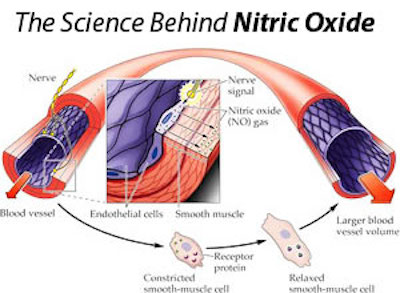The Truth About Nitric Oxide Supplements

You’ve probably seen these for sale before…
Yes, over the last several years, nitric oxide supplements have only gotten more and more popular.
If you visit any GNC, you’re likely to find countless different brands of nitric oxide (or NO, as it’s more commonly known).
All of them scream at you with fast promises of more muscle, better recovery, and increased performance.
And each bottle showcases some prominent professional bodybuilder looking like he’s about to have an aneurysm…
Yes, this seems like some pretty serious stuff, right?
Well, as we all know, there are many supplements out there that are a complete waste of money, if not outright scams.
And unlike other proven supplements – like fish oil and green tea – the specific benefits of taking nitric oxide are somewhat more nebulous.
This article will help to clarify what you need to know about nitric oxide supplements, and if I would recommend taking them or not.
What Is Nitric Oxide?
Before we get into NO supplements, though, let’s first quickly take a look at nitric oxide itself.
Basically, nitric oxide is a gas that is produced naturally in the body.
This happens when your body breaks down arginine, which is an amino acid found in many foods – such as spinach, crab, shrimp, and turkey, among many others.
So, if you’re like most guys, you’re getting a good amount of arginine in your diet as it as, meaning that you’re already naturally producing nitric oxide even without taking a supplement.
What Does Nitric Oxide Do?
Moving on, now that we’ve defined what nitric oxide is, let’s briefly go over what it actually does.
In short, nitric oxide plays a role in helping to facilitate transport between different cells in your body.
This includes assisting in blood circulation, and regulating the activities of various bodily organs – such as the lungs, brain, liver, and stomach, just to name a few.
In terms of improving your performance at the gym, though, nitric oxide is primarily taken to help increase blood flow to the muscles.
You see, NO is what’s known as a vasodilator.
This means that it will dilate your blood vessels, making them larger in size and resulting in increased blood flow.
Here is a diagram showing how this works:

Many guys believe that this increased blood flow helps shuttle more nutrients to the muscles during weight training – which, as a result, helps them get bigger, stronger, and recover faster.
If you’ve read my article on the pump, this may sound kind of familiar…
That’s right, in many ways the supposed benefit of training for the pump and using a nitric oxide supplement is the same: increased blood flow to the muscles, leading to better nutrient uptake.
Do Nitric Oxide Supplements Actually Work?
And now we come to the million dollar question…
Yup, nitric oxide supplements make up a large percentage of the growing $3 billon fitness supplement market, so it’s probably a good idea to see if they deliver on their many promises!
Well, strictly in terms of giving you a better pump at the gym, I can personally attest to this being true.
I haven’t taken an NO supplement for many years, but there was a time back in 2008-2010 when it was part of my supplement routine.
I would take the NO pills before hitting the gym, and they would reliably kick in after just a couple sets.
Basically, I’d get a great pump, and would definitely look more ‘vascular’, which is when you can see your veins more visibly.
Many other guys I know have had the same experience from taking NO supplements: increased pump and more noticeable vascularity.
But as my article discussed, getting a pump for the sake of a pump is largely overrated.
And a temporary increase in vascularity is hardly worth spending money on, if even desirable at all (not everyone wants their veins to pop).
What really matters to you, I would imagine, would be whether taking NO supplements actually boosts performance, not just these temporary cosmetic effects.
Now personally, I never noticed any increase in strength, lasting size, or muscle recovery from taking NO supplements.
None whatsoever.
However, so as not to rely on my limited experience here, let’s take a look at what some of the studies can tell us.
What The Evidence Says
First of all, I should be clear that the impact of nitric oxide on muscle growth and recovery hasn’t been extensively studied.
Most of the studies have only been conducted using younger men; there is very little data on the impact of nitric oxide on performance outside of that limited group.
That being said, the studies that we do have are somewhat conflicting.
For example, one study examined 16 male cyclists and found that, on average, their aerobic threshold increased by 16.7%.
This basically means that they don’t accumulate lactic acid as fast in their muscles, leading to an increase in muscle endurance.
Overall, though, most studies have difficulty determining any significant performance benefits from taking nitric oxide supplements.
In fact, a 2012 review of multiple nitric oxide studies found no conclusive evidence that it did much of anything to help muscle growth.
The review concluded that while nitric oxide may provide marginal benefits for new athletes (or guys that have just started working out), there were no detectable benefits for more experienced athletes.
What’s more, I should point out that the positive studies mainly demonstrated benefits relating to muscular endurance – not strength or size gains.
The Verdict
Well, based on the studies we have so far, I really can’t recommend that you run out and buy an NO supplement.
Yes, I know, they are everywhere – and the guy at GNC just won’t leave you alone about it…
But the fact is that it just doesn’t seem very useful for building muscle and developing your strength.
Sure, if you want a boost to your muscular endurance – allowing you to work out longer, or for some other sort of endurance-based sport – nitric oxide may be more applicable for you.
But, really, you probably don’t want your gym sessions to be so long that you need a supplement to counteract lactic acid build up.
Plus, this stuff isn’t cheap, and has other questionable side effects including abdominal pain, blood abnormalities and low blood pressure.
So, based on all of this, my advice is definitely to give this one a miss for now.
The only benefits that you’re likely to get by taking a nitric oxide supplement are temporary ones: increased pump and greater vascularity at the gym.
And those benefits simply aren’t worth spending lots of money on or risking your health over.
What is your opinion on nitric oxide supplements? Have you ever taken one? Let us know in the comments below.